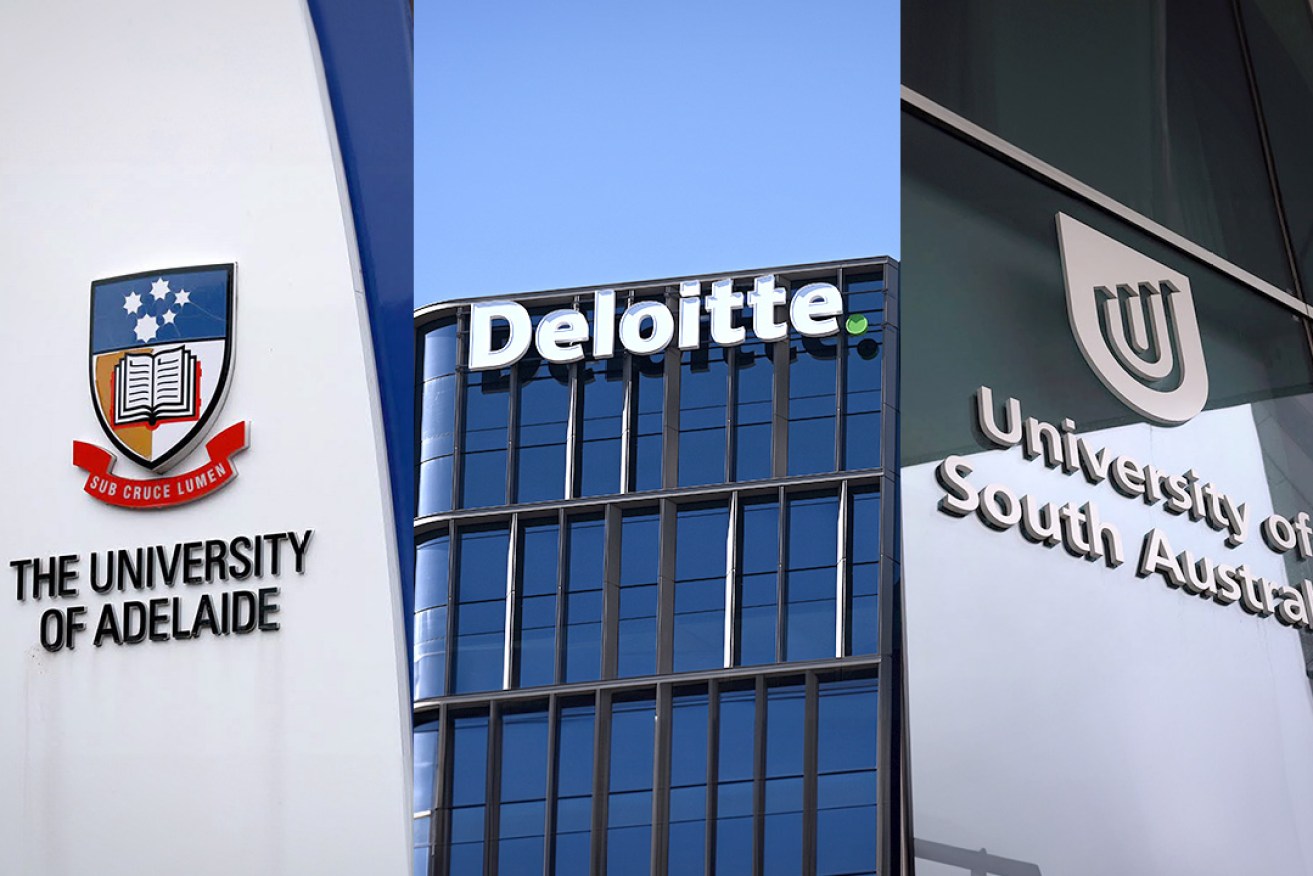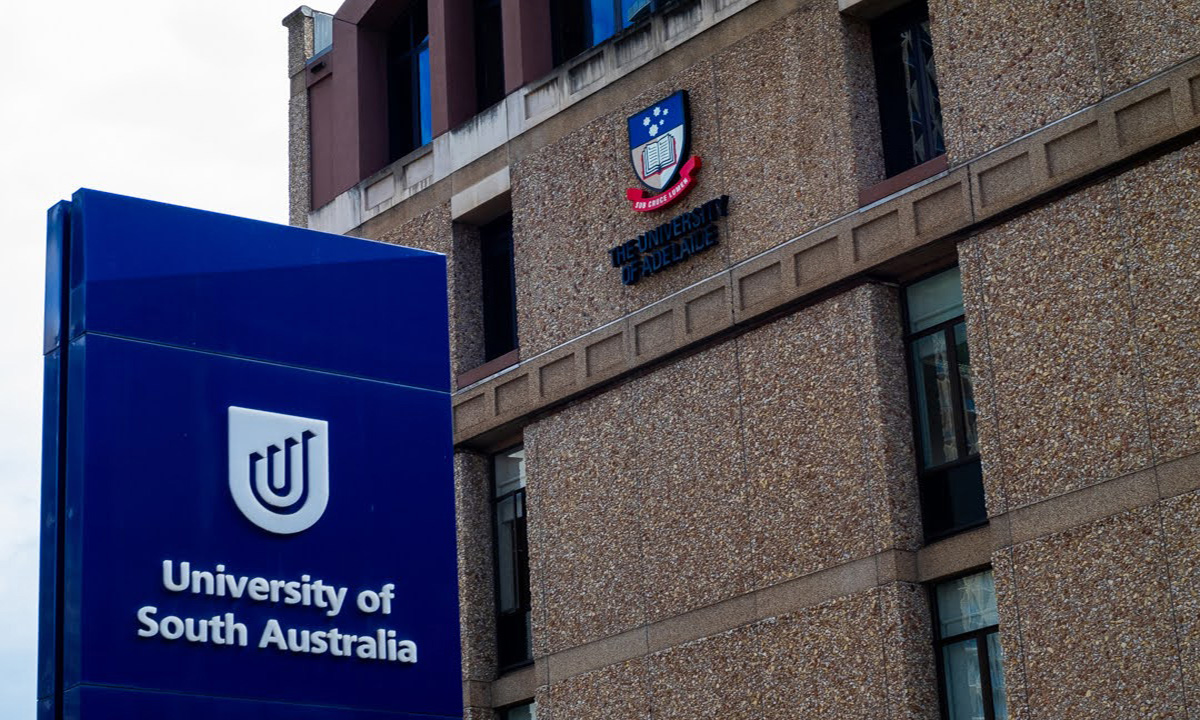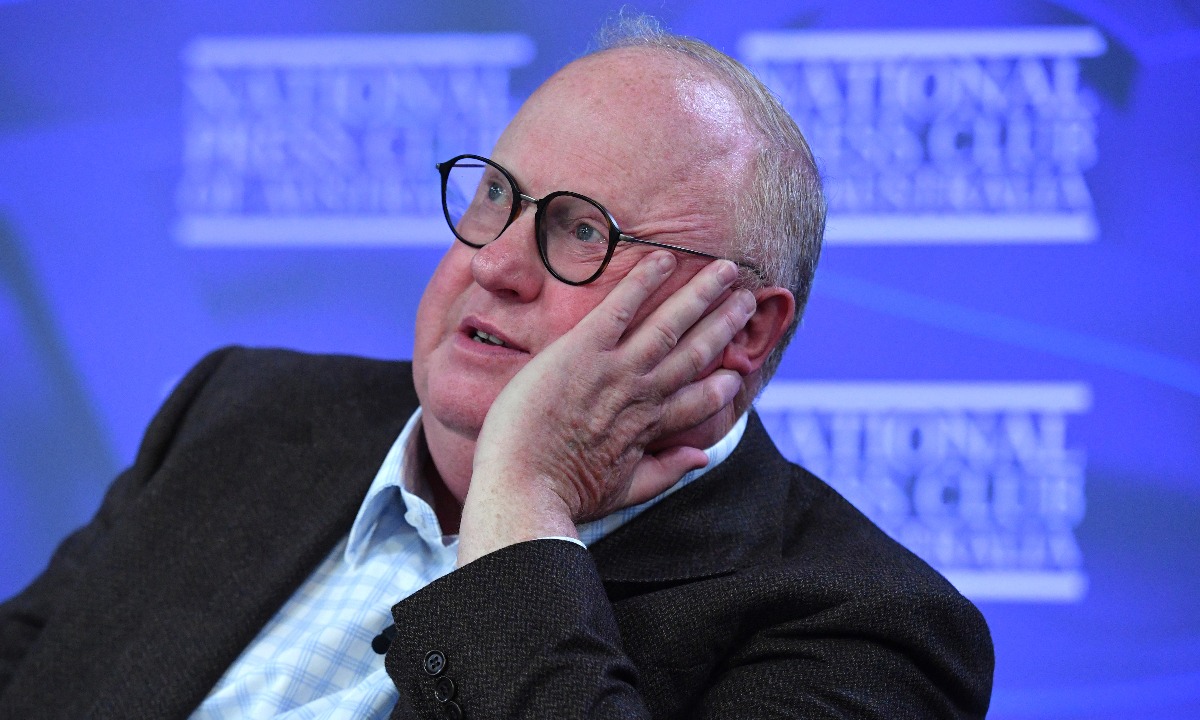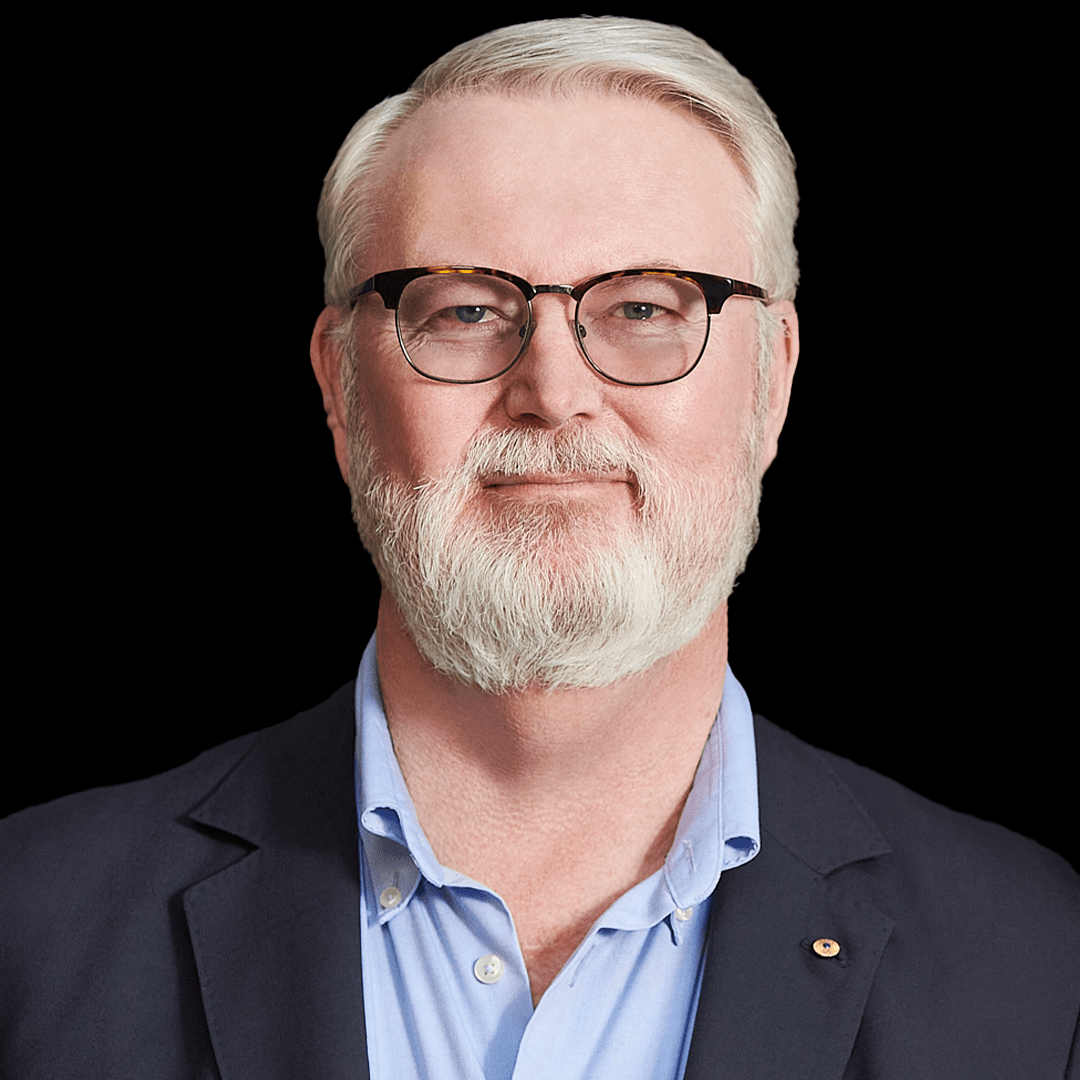Should Deloitte be involved in the SA university merger? Experts have their say
Concerns about potential conflicts of interest have prompted questions about whether the multinational consulting firm should be involved in the merger of the universities of Adelaide and South Australia.


Left and right photo: Tony Lewis/InDaily. Centre photo: Dan Himbrechts/AAP
The University of Adelaide and UniSA on September 14 appointed consulting firm Deloitte as its “integration and transformation partner” (I&T) to manage the merger of their two institutions alongside seconded university staff.
The contract, understood to be worth millions of dollars, was executed three weeks after David Hill, CEO of Deloitte Asia Pacific, resigned from the University of Adelaide’s governing council on August 24.
Hill voted to support the university merger at the council’s June 29 meeting. The University of Adelaide and Deloitte have since faced questions about the probity of Deloitte’s appointment, with the union representing higher education staff, the National Tertiary Education Union (NTEU) SA division, raising concerns about a potential conflict of interest.
InDaily contacted three experts on integrity and business ethics to ask if the two universities’ appointment of Deloitte was handled correctly. One expert said all parties applied “an exemplary process” to the procurement, while another expressed a view that Deloitte should not be involved in the merger at all. A third said the situation could constitute a perceived conflict of interest.
University of Adelaide chancellor Catherine Branson AC KC replied to the NTEU earlier this month to say the university “has no reason to believe that Deloitte Australia had an unfair advantage or privileged information during the procurement process” stemming from Hill’s position on the council.
Branson said Hill had access to the merger transition plan which made clear management’s intention to appoint an I&T partner, but “the potential value of an I&T Partner contract was not explicitly identified in any of the financial modelling presented to the UoA Council in June 2023 or earlier”.
She also said Hill recused himself from an August 7 council meeting in which the council gave the vice-chancellor the power to execute a contract with an I&T partner.
“The UoA Council was not involved in selecting the organisations invited to tender, nor selecting the shortlisted organisations,” Branson wrote, noting that 12 organisations were invited to tender and three were shortlisted.
“In any event, due to a potential perception of conflict of interest, Mr Hill recused himself from attending that (August 7) UoA Council meeting, and he did not have access to the UoA Council meeting papers.”
Hill resigned from the council one day after a joint university approving body – which he was not a member of – endorsed an evaluation panel’s recommendation of Deloitte as the preferred I&T partner.

The merger of the University of Adelaide and UniSA will create one of largest universities in Australia. Photo: Liam Jenkins/InDaily
A spokesperson for Deloitte told InDaily last week: “On 24 August 2023, Mr Hill was made aware of the prospect of Deloitte Australia being jointly appointed by UoA and UniSA and Mr Hill resigned from the UoA Council with immediate effect.”
“As previously stated: The selection and appointment process followed a rigorous and competitive tender process conducted to the highest probity standards by an independent probity advisor and an independent procurement advisor engaged by the two Universities.
“Mr Hill had no involvement with the evaluation of proposals or the decision to appoint Deloitte and resigned prior to Deloitte Australia’s appointment.”
‘Deloitte should never have put its hand up’
New South Wales barrister and Centre for Public Integrity director Geoffrey Watson SC firmly believes Deloitte should not be involved in the university merger. In his view, public sector agencies should be managing the process.
“This whole proposal to involve Deloitte in this project is flawed,” he told InDaily.
“It’s inappropriate to draw upon external consultants for a project like this – this is something integral to the future of tertiary education in the state of South Australia.”
Watson, an integrity expert and former counsel assisting the New South Wales Independent Commission Against Corruption, said Deloitte should not have applied for the contract given Hill’s position on the council.
He said Hill’s vote to support amalgamation now means “it would be a brave person at Deloitte that would ever make any submission to the contrary”.

Centre for Public Integrity Director Geoffrey Watson SC speaking at the National Press Club in 2021. Photo: Mick Tsikas/AAP
“I do not care whether or not there was an attempt to contact, widely, potential external consultants, and I do not care that a probity auditor has signed off on it,” he said.
“Because of (Deloitte’s) intimate connection with the University of Adelaide – I refer here to the CEO having been a member of the university council and having participated in a vote favouring amalgamation with UniSA as a disqualifying feature – Deloitte should never have put its hand up for selection knowing it was in that position of compromise.”
Deloitte did declare a conflict of interest in its tender submission, according to chancellor Branson’s letter to the NTEU.
Branson said Deloitte’s submission “noted that Mr Hill (as CEO of Deloitte Asia Pacific Limited) did not have a management role or other responsibilities in Deloitte Australia”.
“Separation and probity controls (confidential management plan with ethical walls) were put in place by Deloitte Australia between Mr Hill and the bid team,” Branson wrote.
But Macquarie University accounting and corporate governance emeritus professor James Guthrie, editor of the Accounting, Auditing & Accountability Journal, still has concerns.
“There appears to be a perceived conflict of interest between Deloitte’s work on the merger,” Guthrie said, “The chief executive of Deloitte Asia-Pacific, David Hill, was on the University of Adelaide’s governing council for many years.”
Guthrie also said he was “surprised” that the two universities have refused to name the consulting firms that worked on the merger’s business case, saying it would be significant if Deloitte were involved.
A Deloitte spokesperson said last week: “Deloitte had no involvement in any of the feasibility studies that informed the merger decision.”
The University of Adelaide spokesperson declined to answer whether Deloitte was involved, saying: “Any further detail on the engagement of advisers during the feasibility assessment remains commercial and confidential.”
‘An exemplary process’
Dr Simon Longstaff, executive director of The Ethics Centre, a not-for-profit that provides training on ethical decision-making for businesses, believes Deloitte and the universities managed the tender correctly with appropriate disclosures.
“From what I can see, the relevant parties have applied an exemplary process to the tender process,” Longstaff said.
“As far as I can tell, David Hill played no role in the selection of Deloitte to participate in the transition process.
“Furthermore, with the appointment of an independent probity adviser, I doubt that Mr Hill could have exerted any level of influence – even if he had wanted to do so, which I doubt that he did.”
The two universities appointed O’Connor Marsden & Associates (OCM) as an external probity adviser to ensure the procurement process was “transparent, accountable and fair”, chancellor Branson told the NTEU.

Dr Simon Longstaff. Photo: The Ethics Centre
Global consulting firm Kearney managed the overall procurement process, Branson said, providing “a significant level of independence with regard to the process”.
Hill also emailed OCM on September 4, Branson said, to declare that “he was not involved in the development or drafting of Deloitte Australia’s RFP (request for proposal) submission, did not advise the Deloitte team in relation to the submission, and had not shared any confidential information relevant to the RFP or in respect of the procurement process”.
Longstaff, an adjunct professor at UNSW Business School, said problems stemming from conflicts of interest arise when they are “ignored or mismanaged” – not when they merely exist.
“I think that the most important point that I could make is that the ‘mischief’ does not necessarily arise out of there being a real or perceived conflict of interest or duty. Such conflicts are common,” Longstaff said.
“The problems arise when they are ignored or mismanaged. For example, some people think themselves to be possessed of such innate virtue as to be able to ‘rise above’ conflicts of interest or duty.”
Longstaff said a conflicted person is required to withdraw from any involvement in a matter where the conflict arises, adding: “It seems that this is what has occurred in the case of Mr Hill, Deloitte and the universities”.
“That is, the conflict seems to have been as well managed as any I have seen, and that is the salient point,” he said.
“To avoid doubt, I should note that the fact that Mr Hill voted in support of the merger has no bearing on the ethical issues surrounding the alleged conflict.”
Deloitte’s I&T contract will see Deloitte staff working with university staff on the merger within a new “integration and Management Office” on North Terrace.
Deloitte has other relationships with the University of Adelaide, including a program called “The Academy by Deloitte” in which the consulting firm offers work experience and paid internship opportunities to University of Adelaide students and co-delivers undergraduate elective courses.
Legislation to establish the newly merged university is set to pass parliament by the end of the year after the Malinauskas Government last week secured the support of the two crossbenchers it needed to get the Bill through the Upper House.
Adelaide University is scheduled to open in January 2026.




